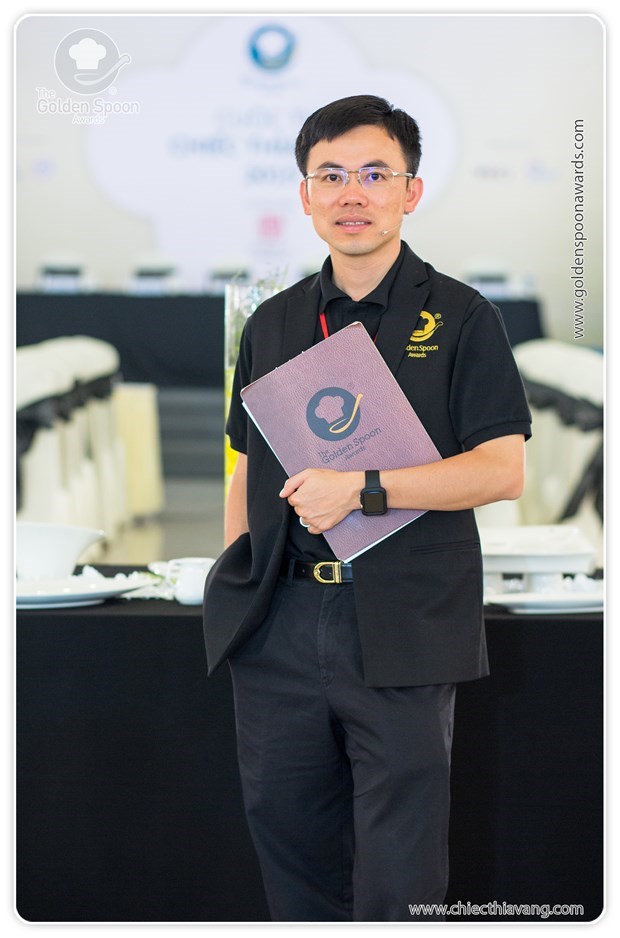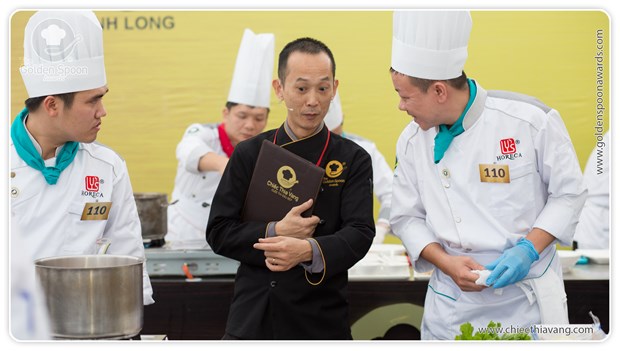Director
Sang Ly represents the fourth generation of Minh Long I, a family business that
has become the quintessential ceramic and porcelain producer in Vietnam. Their
works are pieces of art, often given as national gifts during overseas visits.
Leveraging its international recognition, the century-old business decided to
branch out on a new endeavor: The Golden Spoon contest. Together the aim is to
utilize Vietnam’s budding chef talent to position Vietnamese cuisine within the
world’s kitchen.
We
sat down with Sang Ly to discuss the collaboration.

Sang Ly, Director of Minh Long I
Please tell us where
the idea for the Golden Spoon contest came from and why Minh Long I has been
involved from the start.
The
first edition of the Golden Spoon contest took place in 2013 after much
deliberation on what kind of culinary competition we should have. It was widely
understood that there is a great amount of talent throughout the country, and
that these talented chefs are using many of their own home recipes to advance
their careers. In 4- and 5-star hotels we were especially noticing a trend in
hiring chefs that could increase the authenticity of the Vietnamese menus. But
there was a limit to what this talent could do with these recipes. We wanted to
push past that. We decided to give back to them an opportunity to hone their
craft, while also pushing them to cook at a level of international recognition.
So the Golden Spoon
contest is catered toward Vietnamese chefs?
Traditionally
it has been, but this year we’re making a push into the English-speaking
culinary sector of Vietnam. Chefs enter the competition in teams of three (a head
chef and two assistants). Usually these teams represent a hotel or a
restaurant, but independent chefs can also enter with their own teams. However,
the focus of the competition is still on the flavours of Vietnamese cuisine.
Teams craft their menus to ensure that they demonstrate understanding of the
regional and national cuisine through the use of local ingredients and
authentic taste. There is the opportunity in one of the later rounds to add
fusion to the menu, but the competition is inherently about how much we can do
with our native cuisine.
Do you believe that
the world still underestimates Vietnamese cuisine?
Yes,
but I think it’s because we as a country have not yet properly introduced the
world to the versatility of our food. It’s already recognized that other
culinary giants like Italy, France, China or Thailand have different types of
food per region. Vietnam is very much the same, but I don’t come across many
people who know this. That’s one of the reasons why the Golden Spoon contest
holds preliminary rounds throughout the country, so that we have a collective
mix of all the regions.
During
the competition we see all sorts of specialities. Some of them are so
traditional that when the judges come upon them you can see a bit of nostalgia
in their faces. But can these dishes reach an international audience is the
question. The panel of counselors and judges is designed to help make this
happen, either by coaching or asking questions when the dishes are presented.

David Thai during the Golden Spoon Awards Competition.
How will the Golden
Spoon contest help put Vietnamese food on the map?
First
it starts with the chefs and the hotels or restaurants they represent. By
creating a community, we build a force that is prepared and qualified to take
our national food further and onto the world stage. Together we work toward
this goal, and those that win the contest are better positioned to continue
this process. Anyone involved in the contest acts as an ambassador because they
take with them the excitement and experience of the event back to their own
kitchens.
Then
we have a lot of great support from national media outlets so that the contest
is seen as exciting as MasterChef, and is also worthy of the same coverage as,
say, the Asia Pacific segment of the Bocuse d’Or. And we do get a lot of TV and
print exposure throughout the contest, which we have seen also helps to create
national pride. That’s very important to both us as organizers and the
contestants. After all, we are very proud of our delicious food!
If you were to
compete what family recipes would you enter?
If
I may say, I think I’m better behind the scenes than behind the stove. While my
wife, mother and grandmother are the best cooks I know, our family is better
known for the kind of cooking we do with ceramics. We use state of the art
technology imported from around the world in order to ensure the highest
quality when we produce our world class porcelain pieces. Similarly, to the
Golden Spoon contest, we understand that our expertise is in the traditional
methods that only generations of experience can provide, but we’re not
intimidated by using international methods or machines. Our factory is in Binh
Duong – an area traditionally known for producing such high quality textiles –
but much of the machinery comes from other parts of the world. It’s how we’ve
been able to internationalise our products, and now our most famous and popular
products are in the homes of many esteemed families throughout Europe, Asia and
North America. That’s also what we want for Vietnamese cuisine.
By Monica
Majors/ VFL